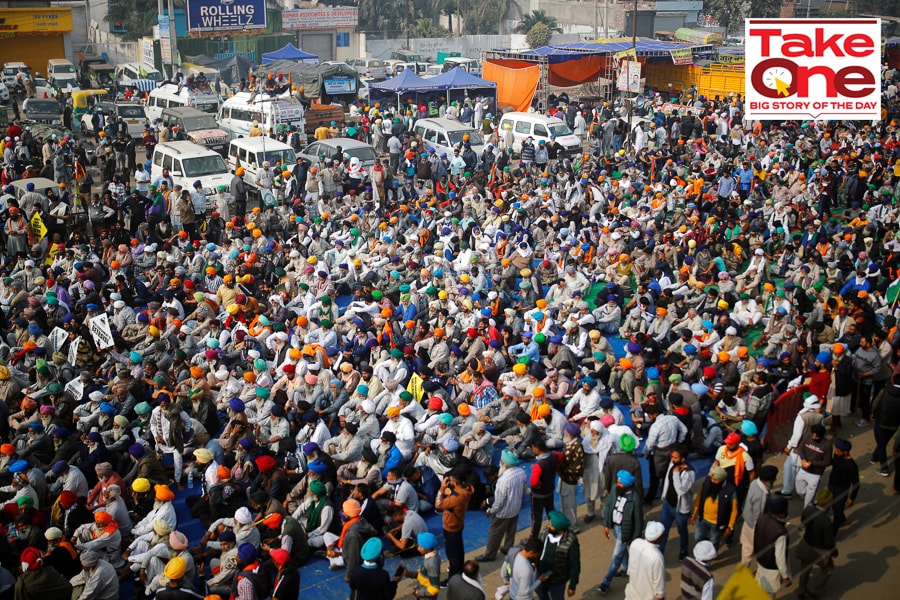
Farm acts: Are the reforms necessary?
Ahead of the farmer-led Bharat Bandh tomorrow, we speak to farmers on-ground to understand the way forward, and why they will continue to stand their ground
 Farmers listen to a speaker during a protest against the newly passed farm bills at Singhu border near Delhi, India, December 5, 2020
Farmers listen to a speaker during a protest against the newly passed farm bills at Singhu border near Delhi, India, December 5, 2020
Image: Adnan Abidi / Reuters
Sharanjit Singh is one of the three lakh-plus farmers who has set up base near the Tikri border in Delhi. He travelled to the capital on November 26 along with a hundred others from Punjab’s Jalandhar district to participate in the ‘Dilli Chalo’ protest. Since then, the number of people who have joined them on the ground has increased manifold.
“Our fight won’t stop until these [Farm] Acts are abolished. It doesn’t matter if it takes days, weeks or months. We won’t go home until our demands are met,” Singh said over a phone call with Forbes India on December 3, as he was gearing up for another round of conversations in a meeting chaired by union agriculture minister Narendra Tomar. With talks so far ending in a deadlock, the government has proposed to hold the sixth round of meetings on December 9 to decide on a way forward.
“The government doesn’t realise the power of farmers yet. The harder they’ll try to suppress us, the more we’ll rise,” says Kashmer Singh, president, Kisan Union Jalandhar, who has been stationed at the Tikri border for the past eight days. “Every consecutive day we are joined by hundreds of people. Till when can the government turn a blind eye?” he adds.
The protest has now entered its 12th day amid a call for a Bharath Bandh on December 8. The government has not yet given into the farmers’ demand of a complete withdrawal of the agricultural reform laws that were passed by the Parliament in September. Kailash Choudhary, union minister of state for agriculture, told news agency ANI that the government is considering making amendments to the laws, but farmers have decided to settle for nothing less than abolishment of the legislation.
The farmers want three Acts—the Farmers' Produce Trade and Commerce (Promotion and Facilitation) Act, 2020, Farmers (Empowerment and Protection) Agreement on Price Assurance and Farm Services Act, 2020, Essential Commodities (Amendment) Act, 2020—to be withdrawn. While the government calls these legislations much-needed farm-sector reform, farmers believe it will only add to the miseries to the already-burdened agricultural sector in India.



 Historically, Punjab and Haryana have had a strong APMC mandi system in place. "The mandi system and MSP are most important for the farmers in these states, because these are the areas which supply a majority of the paddy and wheat. So it is obvious that when there is a threat to these ideas, the protests will be more pronounced in these states," explains R Ramakumar, professor, School of Development Studies, Tata Institute of Social Sciences.
Historically, Punjab and Haryana have had a strong APMC mandi system in place. "The mandi system and MSP are most important for the farmers in these states, because these are the areas which supply a majority of the paddy and wheat. So it is obvious that when there is a threat to these ideas, the protests will be more pronounced in these states," explains R Ramakumar, professor, School of Development Studies, Tata Institute of Social Sciences.
 While lakhs of farmers are protesting against these newly formed legislations, agritech players and farmers who are currently open to working directly with private players believe these changes are necessary to revolutionise agriculture in India. "Farmer are too dependent on AMPC, and in a time of globalisation we need make our farmer produce reach international market. All the three farm laws will push Indian agriculture towards globalisation," says Parth Tripathi, CEO and director of BeeHively Group & Krishna Agro. The agri-businessman believes that consumers are paying a high price in retail markets, yet farmers continue to get low prices.
While lakhs of farmers are protesting against these newly formed legislations, agritech players and farmers who are currently open to working directly with private players believe these changes are necessary to revolutionise agriculture in India. "Farmer are too dependent on AMPC, and in a time of globalisation we need make our farmer produce reach international market. All the three farm laws will push Indian agriculture towards globalisation," says Parth Tripathi, CEO and director of BeeHively Group & Krishna Agro. The agri-businessman believes that consumers are paying a high price in retail markets, yet farmers continue to get low prices.




